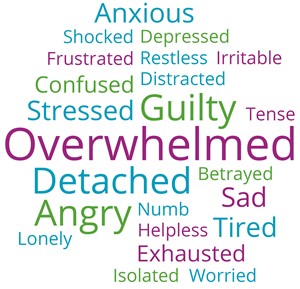The impact of caregiving
In one way or another, every part of your life will be affected by your child’s illness. Even when you are working or caring for your other children or family members, your heart and mind may be focused on the child who is sick. This constant attention can be exhausting and can have a big impact on you, both physically and emotionally.

It is natural for you to want to protect and care for your child. But unfortunately, when your child has a serious illness, there are many things you cannot protect them from, including uncomfortable or painful symptoms, treatments, side effects, and the possibility of death. In these situations, you may feel a sense of helplessness, frustration or grief. It may also affect your relationships with others. This section explores ways that being a caregiver can affect you and the things you can do to take care of yourself and your relationships.
“There were moments where you think, “Come on and die already”. Not that I want it, but it’s part of the exhaustion of waiting out something that is extremely painful. And I don’t think a lot of people have others to say that to or to confide that to. Nobody ever wants their person to be done, it’s just part of the thinking that goes with that long-suffering caregiving, with not enough supports at home.” – Kim, mother of Kevin
Every person’s experience of caregiving is different but some common, difficult feelings may include feeling:

You may also have trouble concentrating, or have changes in your eating or sleeping habits.
On the other hand, at times when your child is feeling more comfortable, you may have moments or days when you feel:

“I clung to my role as his caregiver because it gave me some control and I felt like I was doing something whether it was his tube feeds or managing his medications. As a mom I felt so helpless. I couldn’t stop his cancer, the painful procedures or the fear he had. I was scared as a mom but I felt stronger as a caregiver. My love as a mother just never felt like enough.” Carla, mother of Xavier
You may find it strange to have these positive feelings when there is so much stress or grief, but they are also natural. Your feelings may change from one minute to the next or from one day to the next. Some feelings may happen more often or last longer than others. There is no right or wrong way to feel. Try to pay attention to how you are feeling. Your feelings may tell you when you need to take care of yourself.
When you spend more time caring for your child, you will have less time to manage other responsibilities. You or your partner may have to:
- Take time off work to care for your child or go to appointments
- Turn down promotions (and pay raises) if they mean you have to work more hours or travel
- Stop working if your employer won’t let you have time off when you need it
You may also have to change your normal routines, if one parent is at the hospital and you have other children at home. All these changes can be stressful and may cause conflict between you and your partner.
“Everywhere I looked, people said, “You’re coping”. I thought, so you need me to completely fall apart and totally lose it before you’re willing step in? But I’m telling you, I’m struggling, this is really hard. As a mom, falling apart is not an option right now. There are two tiny people depending on me.” – Esther, mother of Elianna and Eli-Grace












